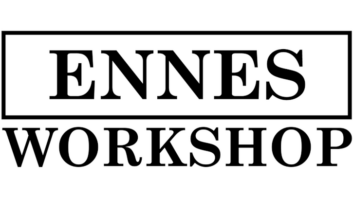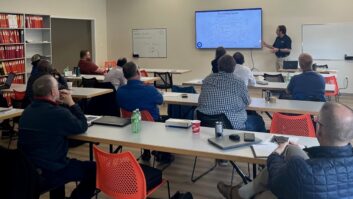
iStockphoto/Geerati Al Gore (with a little help from “Saturday Night Live”) made the term “lockbox” famous in the 2000 presidential election by applying it to the social security fund. That seems like a fine idea, I suppose —locking away the money intended to fund citizens in their senior years — but how about when it is applied to information? That’s not so good, it turns out.
I have always been a believer in sharing information with employees who might need it, so I was shocked when I caught pneumonia a few months ago and ended up in the hospital for a week. That was when I found out what a pitiful job I had been doing.
The amount of information needed to keep my station on the air, yet that was not easily accessible to anyone other than me, was crazy. The station and I both survived the crisis (although it was pretty close call for me), but the experience taught me a lot.
I’M HERE FROM CORPORATE TO HELP YOU
In a large corporation, there are multiple layers of employees spread over many clusters of stations. Someone gets sick, someone else steps in. But in smaller operations, like mine, there are no other clusters; there aren’t even other stations. So I have to get creative about “layering up” the knowledge base. I hadn’t done that, but I’m doing it now.
Our station is in Texas. I’m in St. Louis. Everything — sales, programming, operations, engineering — it’s all done in “y’all” country. Everything, that is, except traffic and billing and a whole bunch of other stuff I didn’t think about, like taxes. I do that here.
There are a few good reasons for this: Some of the tasks just have to follow accounting, which I do here as well. But also, I can keep my finger on sales progress, outstanding invoices and the general financial performance of the station.
The bad news is, I got sick and the whole thing ground to a halt for a week (three weeks, really, as I still had a long recovery after I got home, but who’s counting). Sales went on, logs were manually generated in Texas, thanks to a great effort from my operations manager, but getting the whole thing back on the rails later that month was an order of magnitude harder than it had to be when I finally got well.
I simply had no backup plan to cope with a major illness.
Simple things — where the payroll checks are kept (in the front closet in a lockbox, of all things), who can log on to my laptop, etc. — became problematic; as did things a bit more complex, like how to compute and pay the monthly payroll taxes.
I knew it all. No one else did.
LESSON LEARNED
The lesson? If you are a family-owned station, get one or more family members involved. Not when you think you might get around to it. Do it now.
Everyone else in my family works, so this is not that easy, but with the help of cellphone videos and computers, you can make it work.
I made a flash drive with everything I could think of on it: copies of contact lists and how those people were related to the station (employees, the station’s FCC attorney, the tax person, the traffic system main contact person, utility contact numbers, building maintenance people; the list is daunting). I also included videos of how I do the traffic and accounting processes, from order entry all the way through to billing.
This video turned out to be very long, so I divided it into chapters. Chapter 1, logging onto the traffic system, backing it up and restoring it, if needed. Chapter 2, order entry and so on. You’ll need a big flash drive.
And one other thing: Make sure the person who might need to take over knows where the drive is. I gave one to my son and he put it in his safety deposit box.
You also need this in reverse. My operations guy got sick this year, too (it’s been an odd year), and I had to learn how to schedule music very quickly without his help. That led to a couple of very long nights and an eclectic playlist for a few days.
TIMING IS EVERYTHING
I got lucky (if you can count laying flat on your back in a daze for several days lucky) because I happened to get sick on the third day of the month. Payroll and invoicing was done and sent, no taxes were due until the 15th; very few orders couldn’t be delayed for a few days. It could have been much, much worse.
The point is, you cannot schedule when you get sick. Or worse, when or even if, you might get well again. And some of the things that need to be done — actually, many of them — are very time-sensitive.
If you get really unlucky and head to the big studio in the sky, your heirs or partners will need to file a Form 316 (involuntary transfer of control) with the FCC. Failure to do this can result in an ample fine or, in a particularly egregious case, license issues.
Unpaid payroll taxes carry a hefty fine and interest. And of course, employees tend to get grumpy if they don’t get paid on time.
Trying to navigate all of this with an oxygen mask on — or, worse, from the great beyond — is a prospect you do not want to contemplate.
PARTNERS AND FAMILIES
Remember, also, that this bit of operational insurance is not just meant for family stations.
Do you have a partner? A financial backer who is great at providing money, but knows little about the daily operations of a station? Silent partners are great when you are healthy, but if you get sick, your silent partner is going to get very loud indeed if the operations fall apart while you’re sucking oxygen through a nose tube.
Even with all the automation and improvements in transmitter reliability, radio is still a complicated business. For the uninitiated dealing with a family loss, it would likely be incomprehensible. And in radio, you can’t put a sign on the door that says “Closed for Three Weeks Due to Family Illness.”
It’s much better to open up the lockbox of knowledge and give a few people you trust a chance to peek inside ahead of time.
Comment on this or any story to [email protected].







